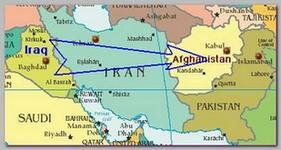– TOP PRIORITY
–
 The conflict in Afghanistan is now the “top overseas military priority” for the new Obama administration and its greatest challenge, the USA defense secretary has said. “There is little doubt that our greatest military challenge right now is Afghanistan,” Robert Gates told the Senate Armed Services Committee, on Tuesday 01/27/2009, warning of a long and difficult fight against Taliban and Al Qaeda forces, but he added, the USA should not have unrealistic expectations and that policy aims in Afghanistan must remain basic.
The conflict in Afghanistan is now the “top overseas military priority” for the new Obama administration and its greatest challenge, the USA defense secretary has said. “There is little doubt that our greatest military challenge right now is Afghanistan,” Robert Gates told the Senate Armed Services Committee, on Tuesday 01/27/2009, warning of a long and difficult fight against Taliban and Al Qaeda forces, but he added, the USA should not have unrealistic expectations and that policy aims in Afghanistan must remain basic.
“We need to be very careful of the goals we set … Our primary goals should be keep Afghanistan from becoming a base for Al Qaeda attacks on the United States.”
Gates warned that the lack of troops meant the USA had not provided “a baseline level of security” against Taliban forces and he was considering increasing the number of US soldiers. Co-ordination with international forces in Afghanistan to combat Taliban fighters had been “less than stellar…too often the whole of these activities has added up to less than the sum of the parts,” he said.
Gates’ remarks came amid anger in Afghanistan over claims that a USA military raid, in the Eastern Afghanistan province of Laghman, at the weekend, killed at least 16 civilians. The US military has denied the claims and said that 15 Taliban fighters died in the operation (see – Kapisa 01.20.09 ). Robert Gates also said that the Pentagon’s efforts in Afghanistan would in the future include better counter-insurgency training for USA and NATO-ISAF forces in order to improve “civil-military” co-ordination for reconstruction efforts and strong USA relations with Pakistan, given the porous border between the two Central Asian nations (see – ANBIGUOUS PAKISTAN).
“We can attain what I believe should be among our strategic objectives: an Afghan people who do not provide a safe haven for Al Qaeda, reject the rule of the Taliban and support the legitimate government that they elected and in which they have a stake,” he said.
Robert Gates comments reflect the change of strategy in USA. Barack Obama’s strategy appears less about nation-building and more about keeping out Al Qaeda and the Taliban.
Barack Obama has vowed, already in his election campaign, to shift military resources from Iraq to Afghanistan and Pakistan, both of which form the central front in the struggle against “terrorism”.
Obama appointed last week Richard Holbrooke, a veteran USA diplomat, as special envoy to both countries. Gates’ remarks came as Mike Mullen, the head of the US military, called for a regional approach to deal with violence in Afghanistan, including talks with Iran.
“Iran, as a bordering state, plays a role as well, and to the degree that we are able to dialogue with them and find some mutual interests, there is a potential there for moving ahead together but I really leave that to the diplomats,” said the Chairman of the US Joint Chiefs of Staff. “Iran is unhelpful in many, many ways, so I wouldn’t be overly optimistic at this point but there are mutual interests that I think might offer some possibilities,” Mike Mullen said.
Turning to the war in Iraq, Robert Gates said that, although violence remained low, there was “still the potential” for setbacks. He described the prospect of a stable Iraq as “crucial to the Middle East”, but warned against looking for a swift resolution to the conflict.
US forces are currently due to withdraw from major Iraqi cities by the end of June this year (2009) and from the country by 2012, as part of a US-Iraq agreement. The US currently has about 34,000 troops in Afghanistan and around 142,000 troops in Iraq. The senior US commander in Afghanistan has requested 30,000 more troops deployed to the country to help combat the Taliban.
***********A************
Read more ;
.